The mantra ‘SEO is dead’ has been heard in blogs and boardrooms for what seems like a long time now. Pretty much ever since SEO was born as a marketing strategy back in 1997, people have trumpeted its demise. These proclamations were always hysterical – shat out in a huff by people who didn’t like SEO or weren’t good at it or didn’t understand it. An aspiring obituary not backed by an existential threat.
Today though, with the rise of AI, the cliche is starting to seem less wishful. In March 2025, Google’s share of searching dipped below 90%. That’s the first time that has happened in over ten years.
To respond to the threat of AI, Google has bolted AI overviews into its results. But will those satisfy in a world where people are tired of suffering through endless blue links to find things, period? It’s a bit like trying to add go-faster stripes to a dinghy in the hope that it’ll keep up with a speedboat. Maybe. We suppose it’s hubris to refer to a behemoth like Google, as a dinghy.
Anyhoo, let’s take a bit more of a look at what’s going on…
 The stats show people are finding things with AI
The stats show people are finding things with AI
Google’s search share has declined to historic lows in 2025 but those aren’t the only telling deteriorations in SEOs vital signs.
Recent surveys show that a sizeable share of everyday users now favor chatbots over search engines. In late 2024, 27% of U.S. respondents (and 13% in the UK) reported using AI tools like ChatGPT instead of traditional search engines. Another study by Evercore found ChatGPT was the preferred search tool for 5% of people by Q4 2024 (up from only 1% in mid-2024), while Google’s first-choice share slipped from 80% to 78% in that span. By early 2025 roughly 1 in 4 American adults had used ChatGPT at least once, highlighting how quickly these assistants have entered the mainstream. Overall, analysts estimate nearly 987 million people worldwide use AI chatbots in 2025, a “stunning figure” that speaks to rapid mainstream adoption.
At the corporate level, Dotdash Meredith, the U.S’s top digital and print publisher, revealed during a recent earnings call that Google now delivers roughly half the referral traffic it did four years ago. That sharp drop signals something seismic is shifting in how audiences discover information online.
The Crocodile Effect – decoupling impressions and clicks
Chatbots like ChatGPT and Claude have become go-to gateways for answers to a wide range of questions, from the practical to the emotional. For good reason: people don’t want to struggle through sponsored placements, content marketing, or keyword optimization to get what they need. It’s far simpler to ask questions and receive answers that are immediate and mostly ad-free (for now) .
At the same time, the familiar ecosystem of search engines is quietly breaking down. For years, brands and marketers relied on keyword research, technical tweaks, and algorithmic scrutiny – aware of the mechanics enough to deliberately climb rankings. That framework, though imperfect and a tad machiavellian, felt workable.
Now? That comforting world is fading away.
One curious loss affecting those search engines integrating AI, like Google, is something loosely known as the Crocodile Effect. Not long ago there was a predictable connection between impressions, ranking positions and clicks to your site. If people saw you more in Search then you’d get more traffic. Always.
Not today. The jaws are open and it’s jarring. Impressions and rankings have disconnected from traffic. People are seeing more from brands but clicking through to their websites less. Folk don’t need a diversion if they already have the answer. Here’s the crocodile in the wild…
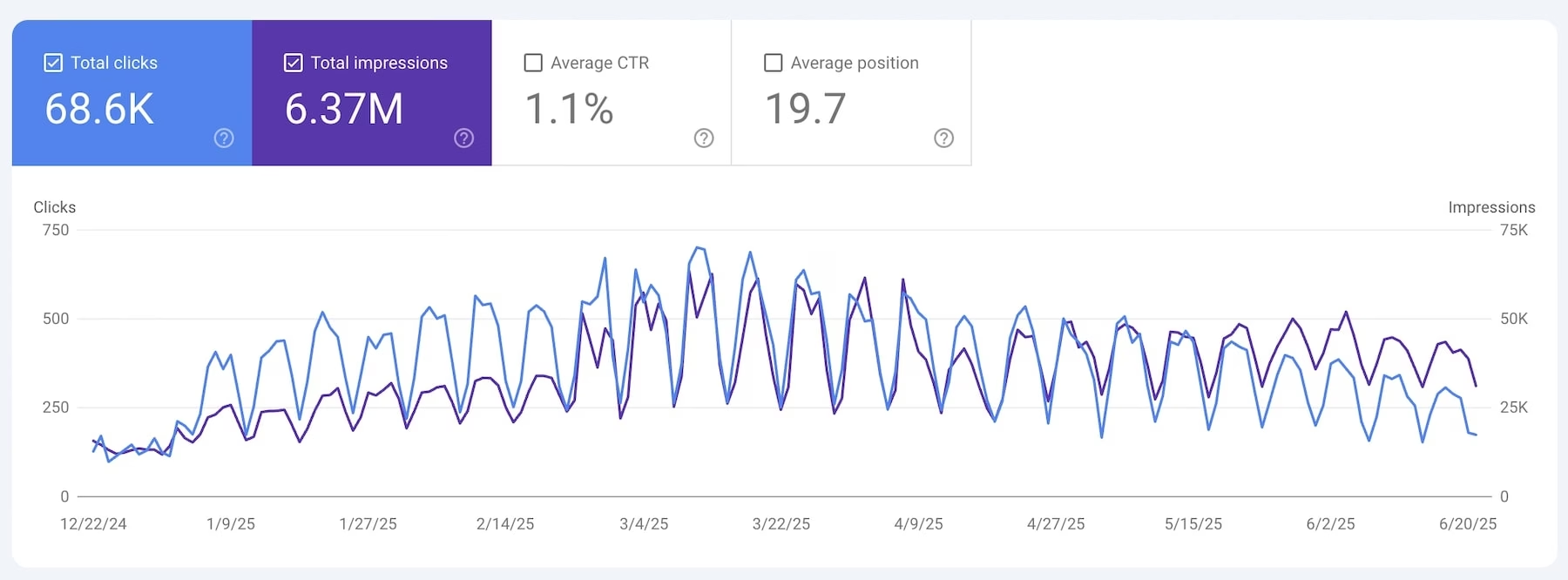
You still can get useful traffic from SEO but only if you reshape your strategy. What worked before won’t work now.
A return to dark arts and snake oil
Predictably, as SEO stutters, a new crop of gurus has emerged, peddling fancy new acronyms like AIO (AI Optimisation) and GEO (Generative Engine Optimisation). Underneath the umbrella terms, there’s a new glossary of jargon to enjoy, like “Chunking”, which is about splitting content into palatable chunks for LLMs.
Yet, bold claims about “winning AI search” likely reflect opportunism, not truth.
What’s delivered by an AI model today can differ tomorrow – dependent on prompt wording, model version, location, or engine used, and even the predilection for AI models to sycophantically make sh*t up if they don’t have an answer. The result? Answers from AI are flaky and sometimes hallucinatory.
That’s before you even consider that AI is inherently less susceptible to manipulation than an algorithm that’s looking at a defined selection of factors.
Brands are seeking a predictable ‘playbook’ of optimisation in the age of AI – and they’re being met by those claiming to hold the answers. But it’s misleading.
So what’s success?
As Google’s algorithms have evolved, SEOs have moved from dodgy tactics like stuffing thousands of keyword mentions into tiny hidden boxes to ‘creating useful content for people’.
But AI is something else. It’s a simulacrum of human intelligence – sometimes more, often less, but it’s deeper than a dumbish algorithm. That means success is no longer about deceptive subterfuge.
Success now means being intelligible to humans and machines. You have to be seen and valued by the systems generating responses. Brands must ask: is our presence structured, clear, consistent enough for AI synthesis?
Or, another way to think about it is: before SEO, brands used to be recommended not because of their content marketing, or keyword tricks, but because of their singular quality. Are you that kind of brand again? A brand that can be trusted, respected and generate Word of Mouth because of the inherent value you create?
In that sense there is a lot of overlap between contemporary SEO and AI citations. The same things work. Quality and trust.
Google itself even says the two things use the same processes. In a recent presentation, Gary Illyes – an analyst on the Google search team – discussed the equivalence between AI and SEO in Google’s search results. He emphasised that no special tricks are required.
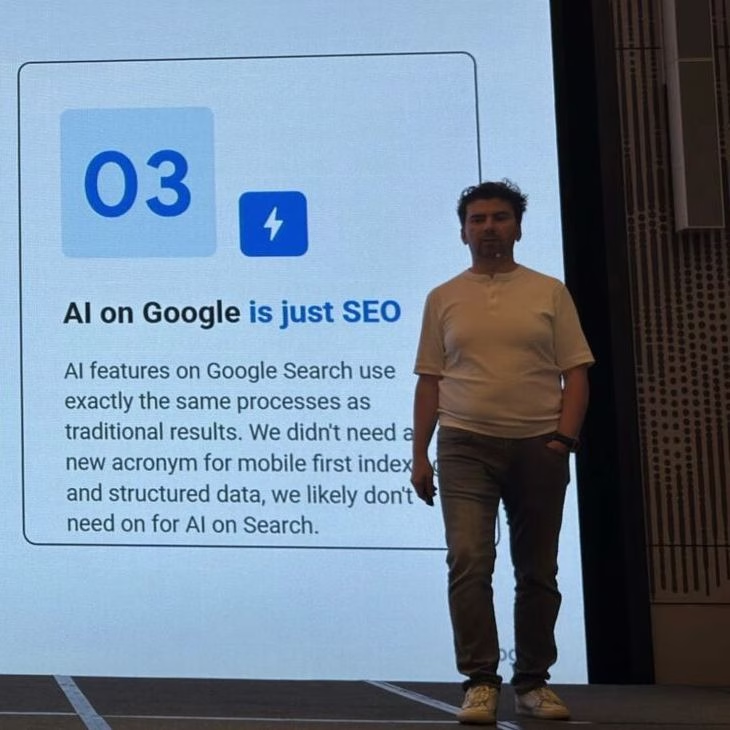
Don’t forget about browser evolution
People are searching differently. And simultaneously, a new wave of AI-enabled browsers is emerging – like Comet, developed by Perplexity AI. These aim to redefine how we interact with the internet. Instead of acting as simple portals, they’ll browse and act autonomously on your behalf. You won’t have to endure the rigmarole of finding then reserving a flight because it will all be researched and booked for you.
Browsers like Chrome, Safari, Firefox, are more than just windows into the world; they shape how we navigate the web, how industries take shape, and how brands build presence. History shows shifts: Internet Explorer once ruled, followed by Firefox, then Chrome’s rise. Now, we may be entering yet another battleground.
Summary: what on earth to do?
There are no dark arts to get your brand soaring in Google’s AI overviews, regardless of what AIO / GEO Ninjas say. But there are some honest things you can do to maintain SEO visibility while also getting traffic from AI recommendations. Here are our top tips for now to tie everything up – with the emphasis on ‘for now’.
- Extend your reporting to make sure that you understand where you’re appearing. Google has been testing AI reports in Search Console, for example, or you could separate AI into separate channel groupings in Google Analytics.
- Create top quality content that’s well structured and visual.
- People search using AI Chatbots in a more rambly conversational way versus the abrupt phrases of classic SEO (‘sustainable marketing agency’ vs. ‘can you recommend a sustainable marketing agency that might be able to help me in Europe in English, please?’). So take exact keyword volumes with a pinch of salt when creating content. Instead, consider overall themes and audiences.
- Avoid scientific ‘top-of-funnel’ content where people would rather get a quick AI summary that assimilates a load of sources instead of just, like, your opinion. Don’t write a post on ‘how to…’ or ‘what is…’ unless it’s a very special take.
- Be creative and tell original personal stories that AI can’t easily replicate. Even better to be a little opinionated or against the grain, like AI isn’t.
- Remember that for now AI is still referencing a lot of the content marketing that worked before. So continue to create blog content because that’s a way to get new references from AI, too.
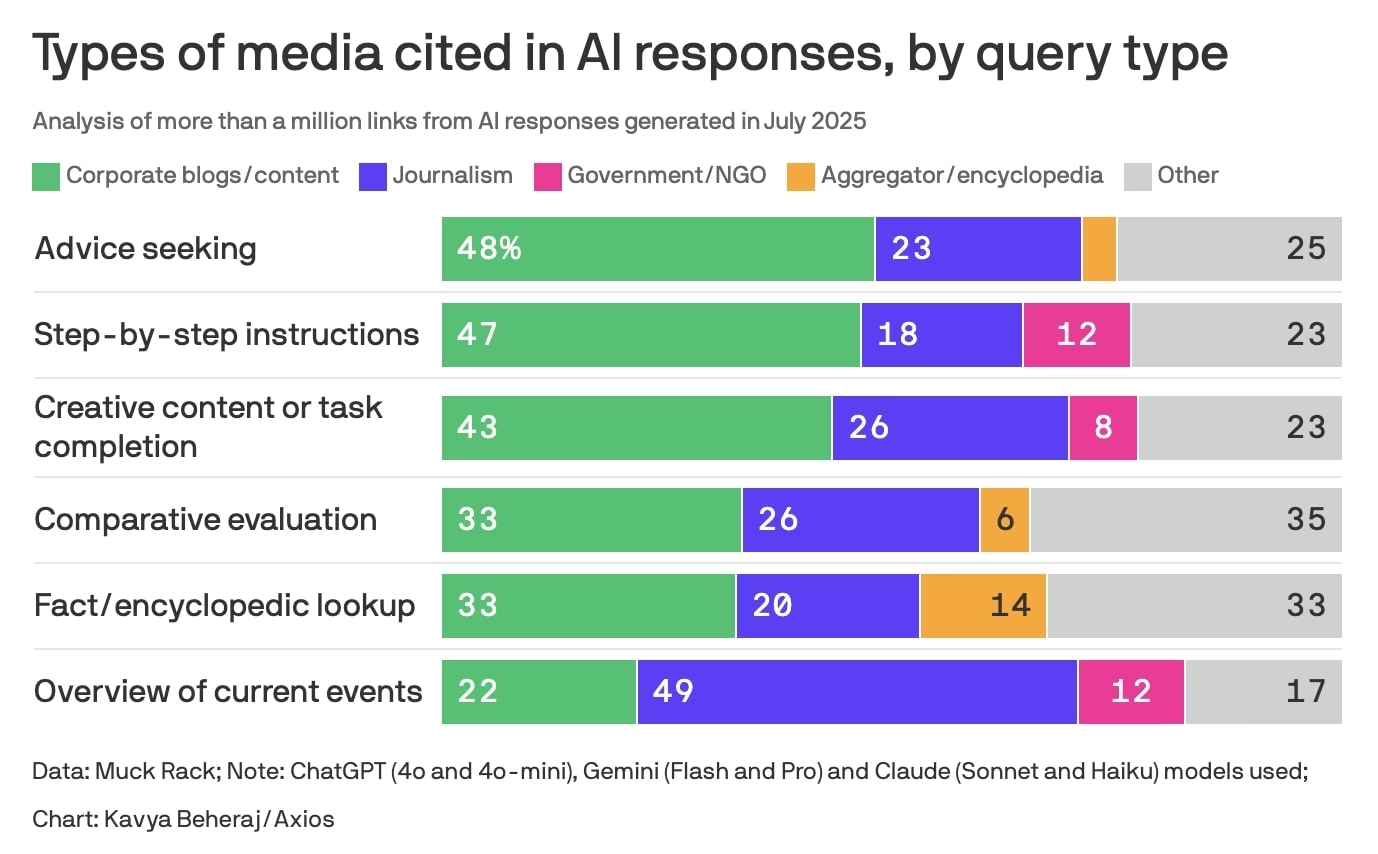
- Adopt the Reddit spirit. People search for ‘x + reddit’ because they want a human perspective above anything else. Bring a bit of that personality into your brand’s content.
- Philosophically, get back to thinking about how people found things before SEO. Consider AI to be like an erudite – if unreliable – friend making recommendations.
- Embrace unpredictability. What works today might vanish tomorrow. The relative steadiness of SEO has been rocked.
- On the other hand, don’t change too much! Some of the same ‘brand building’ things that work for modern SEO will also help you to be cited by AI.
- Simply, make sure AI agents can crawl your site and there are no technical barriers (although we wouldn’t add an LLMS.txt file, just yet).
- Examine your server logs using tools like Screaming Frog. This can give you a deeper view of how AI chatbots are interacting with your content. Standard analytics like GA4 can’t tell you what’s happening when people engage with your content through ChatGPT or Custom GPTs.
We’re just at the dawn of a new age, so some of these recommendations could be like pious sandcastle offerings about to be washed away at any moment. We get that.
Still, what will endure is creating content that’s good. If AI is intelligent, then make your content intelligent so it gets appreciated. No more keyword stuffing and writing crap to target a certain number of searches.
Friendly reminder: SEO is not dead… yet
After a long period of resilience, the familiar SEO rules are crumbling and tomorrow’s will leap out from nowhere. This shifting of the guard has been a long time coming but we should remember that it’ll take a while – there are still plenty of people searching in the classic way. Many of those people are still searching for SEO in a way that suggest that SEO is more alive – whatever all the ambivalent exposition in this post says!
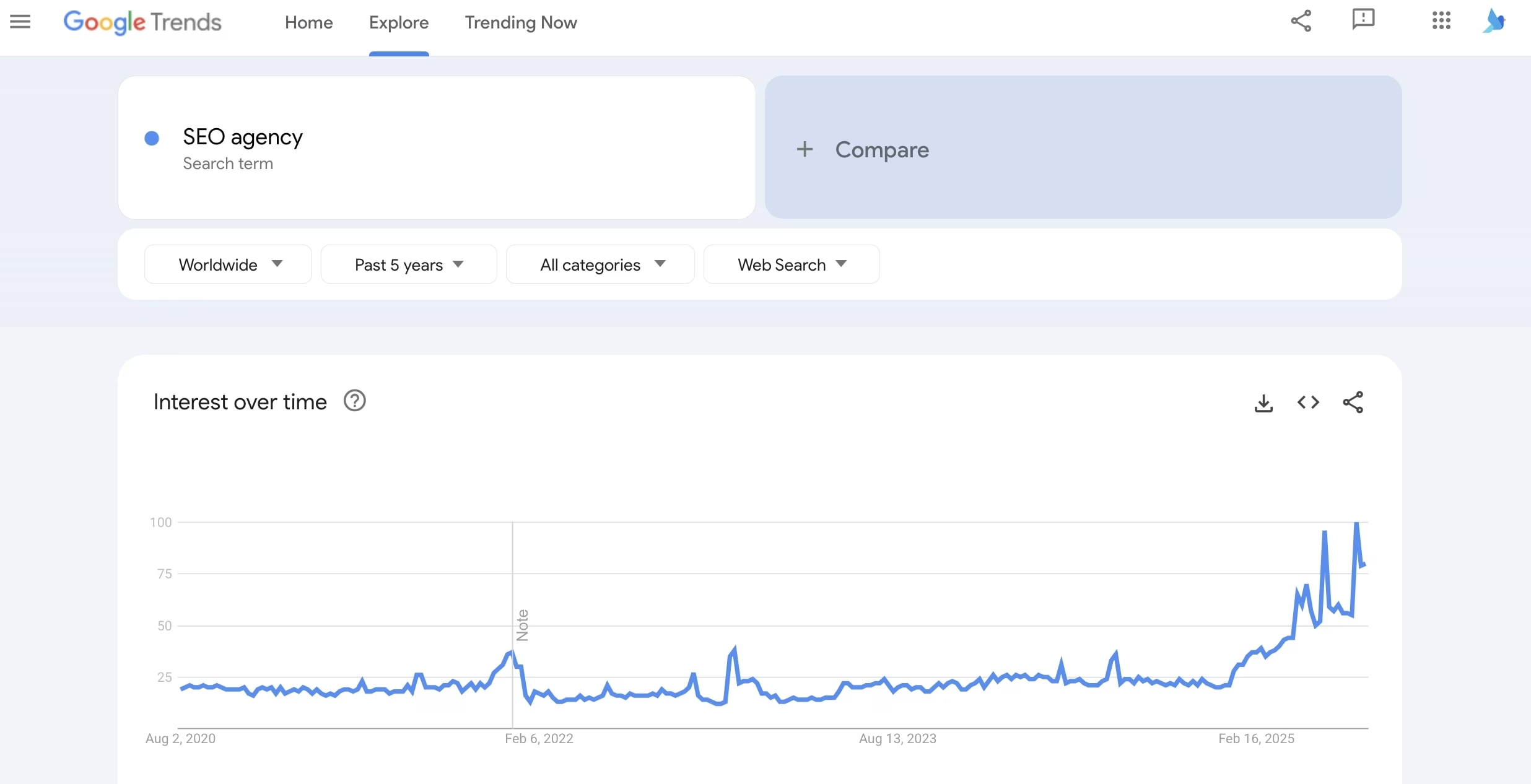
And even then, the same things you were doing before AI appeared are going to work at getting AI to notice you, anyway.
So guess what: SEO isn’t dead, not yet, not again, and the future is uncertain. Sorry.
Meanwhile, why not try and maximise your rising AI traffic alongside your retro Google traffic. It can be done with the right strategies and we hope some of our tips will help you do that. If not, guess what, you can get in touch.
A final footnote that we can’t resist piping up with as a sustainability marketing agency is on the emissions. Those certainly aren’t optimized. A single ChatGPT is said to result in x10 more electricity than a Google search – and that’s before Google integrated its AI overviews. Requests for images or video are even more intense. Find out more about the environmental impact of Gen AI here because, when we talk about AI, we feel its impact should be part of the conversation.

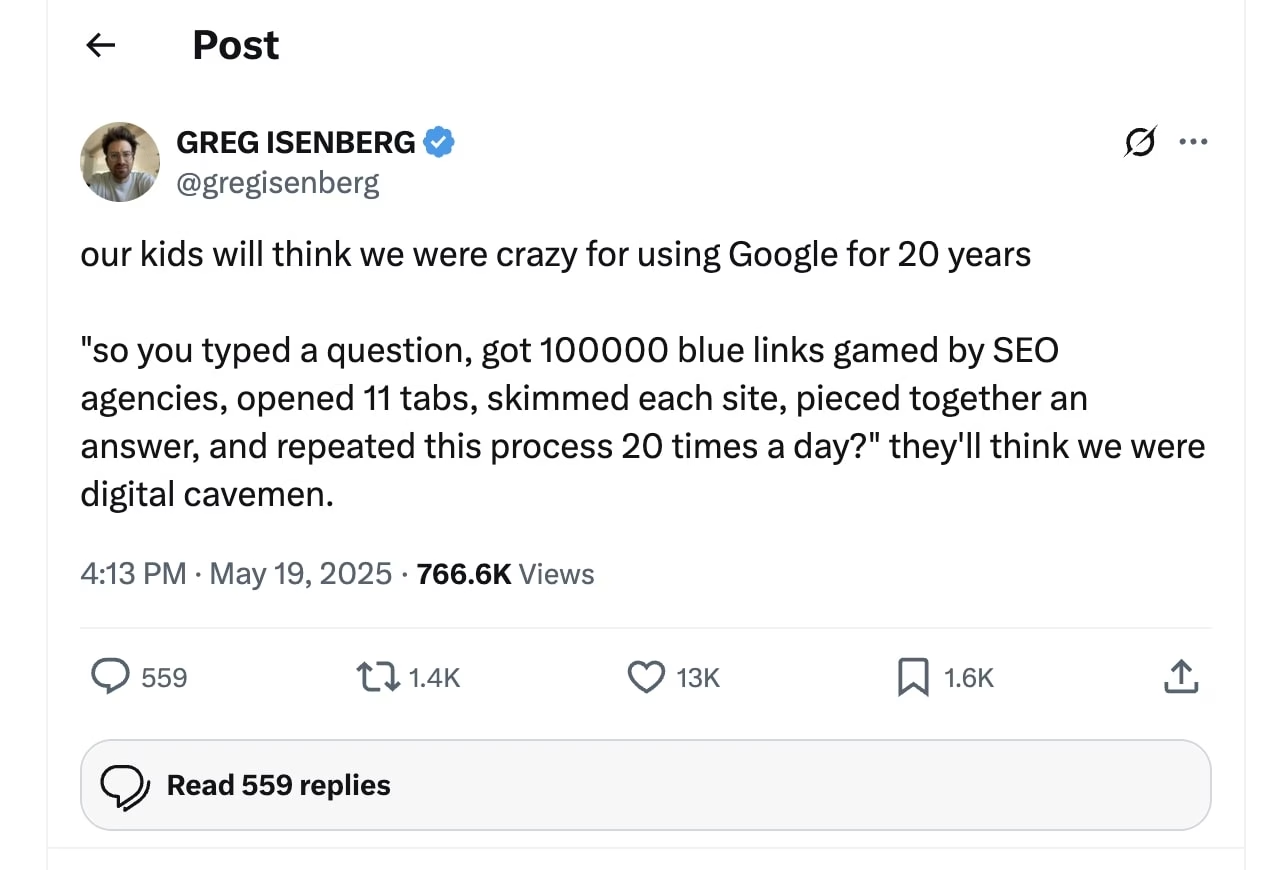 The stats show people are finding things with AI
The stats show people are finding things with AI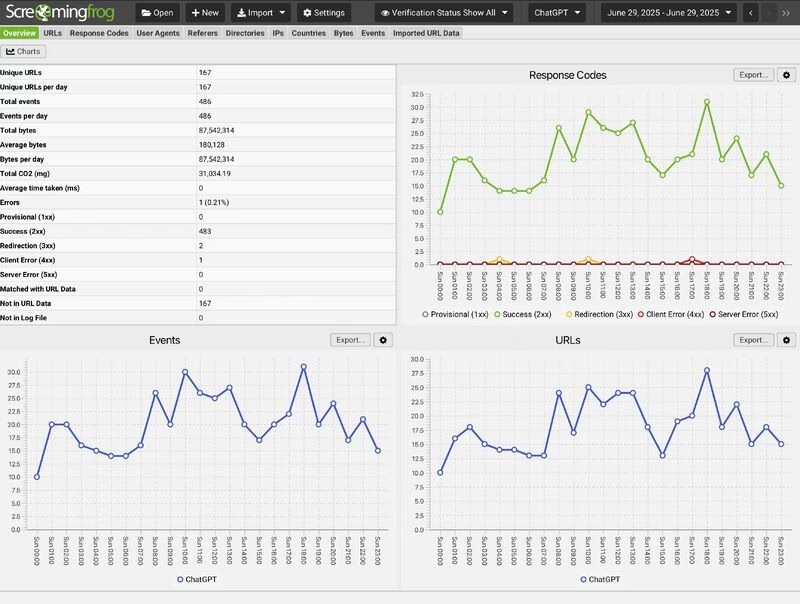


Leave a Reply